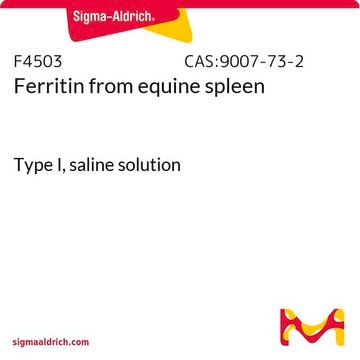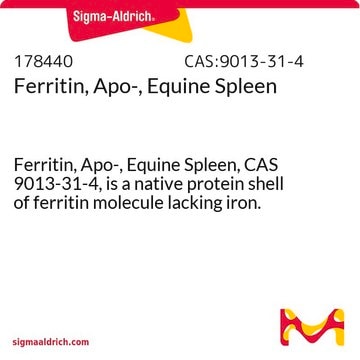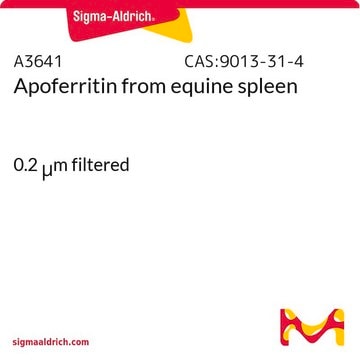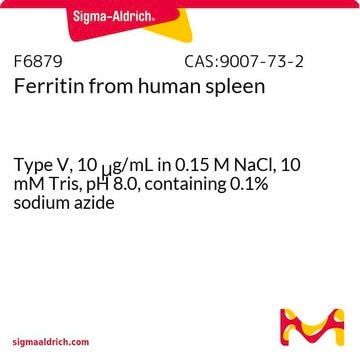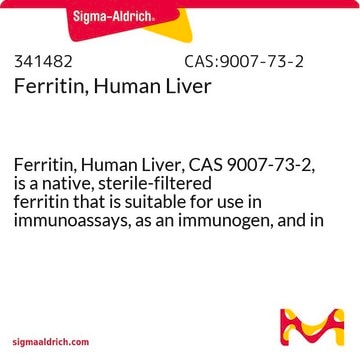F7879
Ferritin, cationized from horse spleen
10 mg/mL in 0.15 M NaCl
Iniciar sesiónpara Ver la Fijación de precios por contrato y de la organización
About This Item
Productos recomendados
biological source
horse spleen
Quality Level
sterility
sterile-filtered
form
liquid
concentration
10 mg/mL in 0.15 M NaCl
technique(s)
cell culture | mammalian: suitable
electron microscopy: suitable
UniProt accession no.
storage temp.
2-8°C
Gene Information
horse ... FTL(100051593)
General description
Ferritin, an iron-storage protein is usually present in the liver and spleen in mammals. Iron and ferritin are distributed relatively same in the eye. Ferritin is made up of heavy and light chains.
Application
A cationic derivative used to label negatively charged cell membranes for visualization by electron microscopy.
Ferritin is an iron storage protein that plays a central role in iron metabolism, and may be elevated in inflammatory or malignant diseases. It has been used in studies as an indicator of body iron supply, but may prove inaccurate in in the presence of chronic inflammation.
Ferritin, cationized from horse spleen has been used:
- to incubate amoebae (106) in the study, to determine whether trophozoites are able to take up ferritin and internalise this protein for their growth in axenic culture
- to determine phagosome-lysosome fusion by electron microscopy
- to label freshly excised chick optic tecta in serum free incubation medium
Biochem/physiol Actions
Ferritin holds iron at its ferric state (Fe3+). The core of ferritin has the capability to hold 4500 iron molecules. It is essential to store iron in vertebrates. Ferritin is also essential to store and transport iron in invertebrates. It plays a key role in dietary iron absorption.
Preparation Note
Prepared by coupling horse spleen ferritin with N,N-dimethyl-1,3-propanediamine (DMPA).
Storage Class
10 - Combustible liquids
wgk_germany
WGK 2
flash_point_f
Not applicable
flash_point_c
Not applicable
Certificados de análisis (COA)
Busque Certificados de análisis (COA) introduciendo el número de lote del producto. Los números de lote se encuentran en la etiqueta del producto después de las palabras «Lot» o «Batch»
¿Ya tiene este producto?
Encuentre la documentación para los productos que ha comprado recientemente en la Biblioteca de documentos.
Los clientes también vieron
Interaction of Legionella pneumophila with Acanthamoeba castellanii: uptake by coiling phagocytosis and inhibition of phagosome-lysosome fusion.
Bozue J A and Johnson W
Infection and Immunity, 64(2), 668-673 (1996)
Fabrizio Bardelli et al.
Scientific reports, 7, 44862-44862 (2017-03-24)
Once penetrated into the lungs of exposed people, asbestos induces an in vivo biomineralisation process that leads to the formation of a ferruginous coating embedding the fibres. The ensemble of the fibre and the coating is referred to as asbestos
Jennifer R Charlton et al.
BMC nephrology, 24(1), 178-178 (2023-06-19)
A significant barrier to biomarker development in the field of acute kidney injury (AKI) is the use of kidney function to identify candidates. Progress in imaging technology makes it possible to detect early structural changes prior to a decline in
R H Adamson et al.
The Journal of physiology, 445, 473-486 (1992-01-01)
1. We have investigated the interaction of plasma proteins with the endothelial cell using cationized ferritin as a marker of the cell surface glycocalyx. 2. Single microvessels of the frog mesentery were sequentially perfused using glass micropipettes with solutions containing
Jennifer R Charlton et al.
American journal of physiology. Renal physiology, 321(3), F293-F304 (2021-07-21)
Kidney pathologies are often highly heterogeneous. To comprehensively understand kidney structure and pathology, it is critical to develop tools to map tissue microstructure in the context of the whole, intact organ. Magnetic resonance imaging (MRI) can provide a unique, three-dimensional
Nuestro equipo de científicos tiene experiencia en todas las áreas de investigación: Ciencias de la vida, Ciencia de los materiales, Síntesis química, Cromatografía, Analítica y muchas otras.
Póngase en contacto con el Servicio técnico